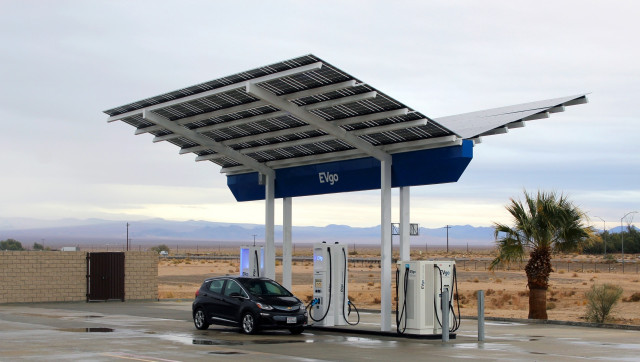
EVgo 350-kw DC fast-charge station, Baker, Calif.
The desert is full of apparitions. The latest is a high-powered DC fast charger for electric cars that don't yet exist.
This apparition is an EVgo charging station in Baker, California, the "Gateway to Death Valley" on Interstate 40, halfway between L.A. and Las Vegas, installed last week.
DON'T MISS: Porsche already has a prototype that will charge faster than its 350-kw Taycan
The new station is equipped with every electric-car charging buzzword, including a solar canopy—both to collect 20 kilowatts of energy from the blazing desert sun and to shield drivers from it—battery storage, and fast charging that can reach speeds of up to 350 kilowatts—a speed no electric cars yet on the market can handle.
A 350-kw DC fast charger can replenish about 240 miles in a long-range, 300-mile electric car in less than half an hour.
EVgo isn't the only charging network that has begun installing 350-kw fast chargers. Electrify America installed one two weeks ago in Livermore, in northern California. Ionity, a charging network in Europe supported by that continent's major automakers, has installed several in Germany. Porsche and BMW even opened a 450-kw demonstration site in Dresden last week.
READ MORE: Porsche's 800-Volt fast charging for electric cars: why it matters
Cars designed to use such fast chargers include the upcoming Porsche Taycan electric, its corporate stablemate the Audi e-tron GT, the Aston Martin Rapide-E, and some new cars from startup electric carmakers, such as the Lucid Air. None are on the market, but the Porsche, Audi, and Aston Martin are expected to be delivered to customers within two years.
The 350-kw fast charger can also slow down to speeds that today's cars can accept.
CHECK OUT: Electrify America switches on the first 350 KW fast charging station in Chicopee, Mass.
Along with the super-fast charger are two 50-kw DC fast chargers, and one new 150-kw and 175-kw station each. All have both CHAdeMO and CCS Combo plugs.
All five chargers at the site are connected to 88 kilowatt-hours of second-life batteries from BMW i3s which store power from the solar panels for use when cars need to charge. The station is similar to a smaller one that EVgo installed in a University of California, San Diego pilot project, though that station does not include a 350-kw charger.